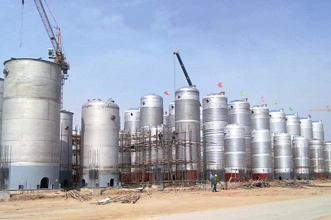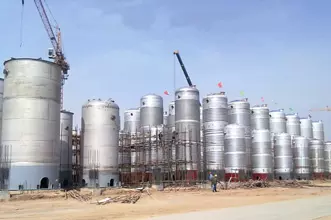Pharmaceutical Industry


Pressure vessels and storage tanks are fundamental components in the Pharmaceutical Industry, supporting critical processes ranging from production to storage and distribution of pharmaceutical products. Here's a detailed exploration of their applications within this sector:
1. Reactor Vessels for Chemical Synthesis:
Within pharmaceutical manufacturing, pressure vessels serve as essential reactor vessels for chemical synthesis. These vessels provide controlled environments necessary for reactions requiring specific pressure, temperature, and mixing conditions. By enabling the synthesis of active pharmaceutical ingredients (APIs) and other compounds with precision and efficiency, they play a pivotal role in pharmaceutical production.
2. Fermentation Tanks for Biopharmaceuticals:
Biopharmaceutical production, including vaccines and recombinant proteins, relies on fermentation tanks. These tanks, operated under meticulously controlled conditions, harbor microbial or mammalian cell cultures. Pressure vessels ensure optimal containment and growth of these cultures, facilitating the production of biologically active compounds vital for pharmaceutical applications.
3. Sterilization Chambers:
Sterilization is paramount in pharmaceutical manufacturing to guarantee product safety and efficacy. Pressure vessels serve as sterilization chambers, subjecting equipment, containers, and packaging materials to high-pressure steam or other sterilizing agents. Their role in eliminating microorganisms ensures pharmaceutical products remain free from contamination.
4. Solvent Storage and Handling:
Solvents play a crucial role in various pharmaceutical processes such as extraction and formulation. Storage tanks securely house solvents, enabling their safe handling during manufacturing. Pressure vessels ensure the integrity of solvent storage, minimizing the risk of leaks or contamination that could compromise product quality and safety.
5. Bulk Drug Substance Storage:
After production, bulk quantities of APIs or drug substances require safe storage. Storage tanks provide a secure environment, preserving stability and purity. Pressure vessels maintain containment of volatile or hazardous substances, mitigating risks and ensuring compliance with regulatory standards.
6. Distribution and Transport:
Proper storage and transport are essential for maintaining pharmaceutical product quality. Storage tanks and pressure vessels support temporary storage before distribution, ensuring product integrity during transit. Pressure vessels in transport containers safeguard sensitive pharmaceutical products, maintaining their efficacy and safety.
7. Compliance with Regulatory Standards:
In the pharmaceutical industry, adherence to regulatory standards such as Good Manufacturing Practice (GMP) is paramount. Pressure vessels and storage tanks must comply with stringent guidelines set by regulatory agencies like the FDA. Compliance ensures product quality, safety, and regulatory approval, underscoring their critical role in pharmaceutical manufacturing.
Within pharmaceutical manufacturing, pressure vessels serve as essential reactor vessels for chemical synthesis. These vessels provide controlled environments necessary for reactions requiring specific pressure, temperature, and mixing conditions. By enabling the synthesis of active pharmaceutical ingredients (APIs) and other compounds with precision and efficiency, they play a pivotal role in pharmaceutical production.
2. Fermentation Tanks for Biopharmaceuticals:
Biopharmaceutical production, including vaccines and recombinant proteins, relies on fermentation tanks. These tanks, operated under meticulously controlled conditions, harbor microbial or mammalian cell cultures. Pressure vessels ensure optimal containment and growth of these cultures, facilitating the production of biologically active compounds vital for pharmaceutical applications.
3. Sterilization Chambers:
Sterilization is paramount in pharmaceutical manufacturing to guarantee product safety and efficacy. Pressure vessels serve as sterilization chambers, subjecting equipment, containers, and packaging materials to high-pressure steam or other sterilizing agents. Their role in eliminating microorganisms ensures pharmaceutical products remain free from contamination.
4. Solvent Storage and Handling:
Solvents play a crucial role in various pharmaceutical processes such as extraction and formulation. Storage tanks securely house solvents, enabling their safe handling during manufacturing. Pressure vessels ensure the integrity of solvent storage, minimizing the risk of leaks or contamination that could compromise product quality and safety.
5. Bulk Drug Substance Storage:
After production, bulk quantities of APIs or drug substances require safe storage. Storage tanks provide a secure environment, preserving stability and purity. Pressure vessels maintain containment of volatile or hazardous substances, mitigating risks and ensuring compliance with regulatory standards.
6. Distribution and Transport:
Proper storage and transport are essential for maintaining pharmaceutical product quality. Storage tanks and pressure vessels support temporary storage before distribution, ensuring product integrity during transit. Pressure vessels in transport containers safeguard sensitive pharmaceutical products, maintaining their efficacy and safety.
7. Compliance with Regulatory Standards:
In the pharmaceutical industry, adherence to regulatory standards such as Good Manufacturing Practice (GMP) is paramount. Pressure vessels and storage tanks must comply with stringent guidelines set by regulatory agencies like the FDA. Compliance ensures product quality, safety, and regulatory approval, underscoring their critical role in pharmaceutical manufacturing.
